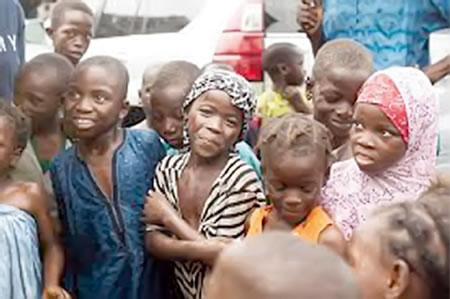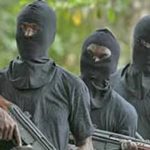The United Nations Children’s Fund (UNICEF) has warned that internally displaced children the world over, including those in Nigeria, are among the world’s most vulnerable to the COVID-19 pandemic unless urgent protective measures are taken to save them.
The warning came as the organisation released a report looking at the risks and challenges facing internally displaced children, and the urgent actions needed to protect them.
The report released by UNICEF Nigeria communication office made available to newsmen in Bauchi stated that in North-East subregion of Nigeria, there are currently 1.9 million people displaced from their homes out of which 60 percent are children, with one in every four under the age of five.
It also stated that globally, an estimated 19 million children – more than ever before, were living in displacement within their own countries due to conflict and violence in 2019 some of which have been on for years.
The report, titled ‘Lost at Home’, also looks at the risks and challenges internally displaced children face, and the urgent actions needed to protect them because as COVID-19 continues to spread around the world, these children are among the most vulnerable to its direct and indirect impacts.
It stated that, “Hundreds of thousands of children in north-east Nigeria are living in the shadow of conflict – and now in the increasingly challenging shadow of a global pandemic and its potential socio-economic aftermath,” said Peter Hawkins, UNICEF Representative in Nigeria.
“When a new crisis like the COVID-19 pandemic emerges, displaced children are especially vulnerable and the gaps in our ability to keep them safe are even more stark. We must urgently work together – all of us, government and humanitarian partners – to keep them safe, healthy, learning and protected,” it stressed.
UNICEF further lamented that the COVID-19 pandemic is making a critical situation for displaced children and families around the world even worse stating that, “They often live in overcrowded camps or informal settlements, where access to basic hygiene and health services is limited, and where physical distancing is not possible. This is true in Nigeria’s north-east, where conditions pose a particular challenge to containing the possible spread of diseases like COVID-19”.
It further observed that, “Internally displaced children around the world often lack access to basic services and are at risk of exposure to violence, exploitation, abuse and trafficking, according to the UNICEF report. They are also at risk of child labour, child marriage and family separation, which all pose direct threats to their health and safety”.
According to the report, there were 12 million new displacements of children in 2019 – 3.8 million of them were caused by conflict and violence, and 8.2 million by disasters linked mostly to weather-related events like flooding and storms.
UNICEF and partners are currently working to protect displaced children in north-east Nigeria through critical health and nutrition services, providing access to life-saving WASH services through accelerated construction of facilities, and adapted solutions to continuing education – including the provision of radios for distance learning while schools are closed.
According to the report, Peter Hawkins stated that, “What we really need now are strategic investments and a united effort from government, civil society, private sector, humanitarian actors and children themselves to find solutions that can protect children from the effects of displacement – especially as we face the COVID-19 pandemic – and also address and help mitigate the longer-term impacts this can have on children’s health and education.”
YOU SHOULD NOT MISS THESE HEADLINES FROM NIGERIAN TRIBUNE
Buy and read digital replicas of your TRIBUNE titles by subscribing through E-VENDING
Osun Discharges Two Children, Six Others After Testing Negative For Coronavirus
Osun State government on Monday night announced the recovery and discharge of eight coronavirus patients including two children from its isolation centre… Read full story
COVID-19: Police Seal Emir Of Daura’s Palace
Police have sealed off the palace of the Emir of Daura, Alhaji Umar Farouk as a result of the monarch’s failure to prevent congestion in the palace. A source who pleaded anonymity stated that the emir assembled over 1,000 people in his palace where he distributed food to them… Read full story
Omowura: Man Who Sat On 200 Needles
Five hundred and thirty five pages in seven chapters girded firmly, front and back, by a Preface, a Foreword, an Afterword and an Acknowledgment! This unusual structure makes this an uncommon biography. The story, if seen as a drama, has all the trappings of a Shakespearean tragedy: There is Ayinla Omowura, the tragic hero… Read full story
S/Korea Begins Payment Of $11.65bn Disaster Relief Money To Households
South Korea on Monday began payment of emergency disaster relief funds totaling 14.3 trillion won (US$11.65 billion) to all households, Reuters reports. The money is enable the households to cope with the economic impact of the coronavirus outbreak… Read full story
Delta Farmer Harvests World’s Largest Cassava Tuber
A farmer, Mr. Chuwudumebi Innocent Nwogwonuwe of Onitcha-Okpe Quarters, Ubulu-Uku, in Aniocha South Local Government Area of Delta State, Nigeria, has harvested what is considered the largest tuber of Cassava in the world. The cassava tuber which is named scientifically as Manihot Esculenta measures over 10 feet in,,, Read full story
Police Intercept, Return 42 Zamfara Travellers Who Hid In Truck In Lagos
Forty two passengers who were allegedly trying to move from Zamfara State into Lagos State through a food truck were on Monday intercepted by the police and sent back to their state. The image-maker in charge of the state police command, Bala Elkana, confirmed the development to the Tribune Online and warned other… Read full story






